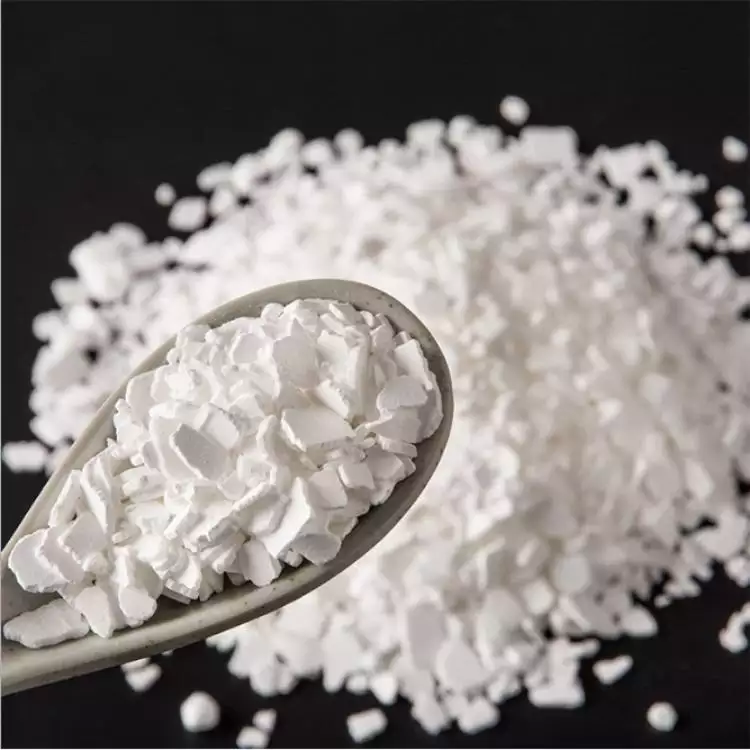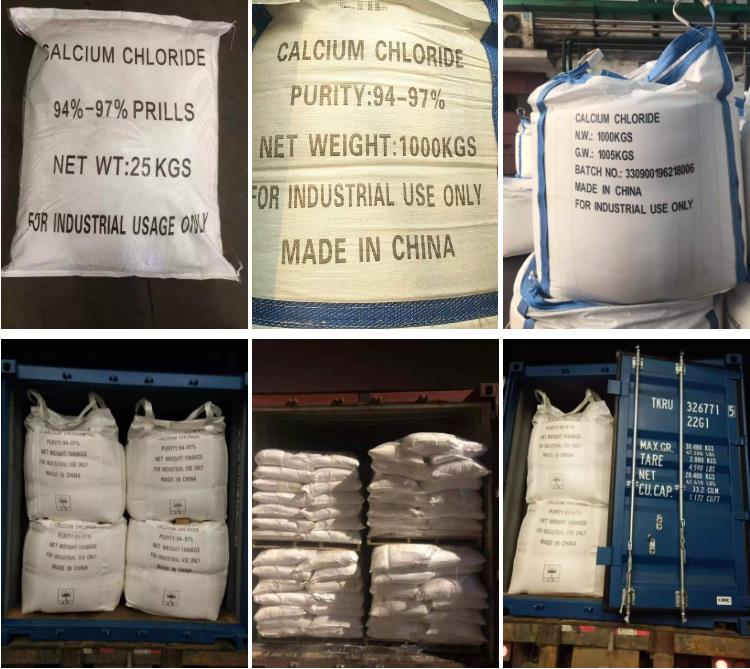What is Calcium Chloride?
Calcium chloride is a salt that is made up of calcium and chlorine. It is a white crystalline solid that is highly soluble in water and is used in various applications, including deicing, food processing, medicine, and agriculture. Calcium chloride is often produced as a byproduct of the Solvay process, which is a method for producing sodium carbonate.

| Item | Calcium Chloride Dihydrate | Calcium Chloride Anhydrous |
| CAS | 10035-04-8 | 10043-52-4 |
| Chemical Formula | CaCl2.2H2O | CaCl2 |
| Purity as CaCl2 | 74%min | 94%min |
| Alkalinity as Ca(OH)2 | 0.2%min | 0.25%min |
| Total Alkali Chloride as (NaCl) | 5.0%min | 5.0%min |
| Water Insoluble | 0.15%min | 0.25%min |
| Fe | 0.006%min | 0.006%min |
| PH | 7.5-11.0 |
| MgCl2 | 0.5%max |
| CaSo4 | 0.05%max |
| Appearance | White flake, powder and granule | White powder |
| Standard Package | 25kg/1000kg woven bags with PE liner inside |
1.1 Definition and Chemical Formula
Calcium chloride is a chemical compound represented by the formula CaCl2. It consists of one calcium ion (Ca2+) and two chloride ions (Cl-). The compound is highly hygroscopic, meaning it readily absorbs moisture from the surrounding environment. In its solid form, calcium chloride appears as a white, crystalline substance.
1.2 How is it Produced?
Calcium chloride is primarily produced as a byproduct of the Solvay process, which involves the production of soda ash (sodium carbonate). It is also obtained through the neutralization of hydrochloric acid with calcium carbonate or calcium hydroxide.
2. Properties of Calcium Chloride
2.1 Physical Properties
Calcium chloride exhibits several notable physical properties, including:
High water solubility: Calcium chloride readily dissolves in water, forming a clear and colorless solution.
Hygroscopic nature: The compound has a strong affinity for water, making it useful as a desiccant.
Exothermic dissolution: When calcium chloride dissolves in water, it releases heat.
2.2 Chemical Properties
From a chemical perspective, calcium chloride:
3. Industrial Applications
3.1 De-icing and Road Maintenance
One of the most common uses of calcium chloride is in de-icing and road maintenance during winter. It lowers the freezing point of water and prevents ice formation on roads and walkways.
3.2 Food and Beverage Industry
Calcium chloride finds applications in the food and beverage industry as a firming agent and preservative, ensuring the quality and shelf life of various products.
3.3 Water Treatment
In water treatment, calcium chloride helps to adjust the water's hardness, preventing scale formation in pipes and equipment.
3.4 Concrete Accelerator
The compound accelerates the setting time of concrete, making it a vital ingredient in construction projects with tight timelines.
3.5 Desiccant and Moisture Absorber
Due to its hygroscopic nature, calcium chloride is used as a desiccant to remove moisture from the air in confined spaces.
4. Medical and Pharmaceutical Uses
4.1 Intravenous Therapy
Calcium chloride is used in intravenous therapy to treat calcium deficiencies and manage certain medical conditions.
4.2 Electrolyte Replacement
In medical emergencies, it serves as an electrolyte replacement for patients experiencing electrolyte imbalances.
4.3 Tissue Preservation
In laboratories and medical facilities, calcium chloride aids in tissue preservation during certain procedures.
5. In Agriculture
5.1 Soil Amendment
Calcium chloride is used as a soil amendment to improve soil structure and promote plant growth.
5.2 Dust Control
It helps control dust on roads and agricultural fields, creating better working conditions.
5.3 Post-Harvest Applications
In post-harvest storage, calcium chloride extends the shelf life of fruits and vegetables by reducing spoilage and decay.
6. Environmental and Household Applications
6.1 Snow and Ice Removal
Apart from its use in road de-icing, calcium chloride is employed for snow and ice removal in various settings.
6.2 Humidity Control
In households, it acts as a moisture absorber, preventing mold and mildew growth in damp areas.
6.3 Water Hardness Adjustment
In swimming pools, calcium chloride is added to adjust water hardness levels for optimal pool maintenance.
7. Safety Precautions and Handling
7.1 Storage and Transportation
When handling calcium chloride, proper storage and transportation practices are crucial to ensure safety and prevent accidents.
7.2 Protective Measures
Workers handling the compound should use appropriate personal protective equipment, including gloves and eye protection.
8. Calcium Chloride vs. Other De-icing Agents
8.1 Effectiveness
Compared to other de-icing agents, calcium chloride is known for its rapid and efficient ice-melting capabilities.
8.2 Environmental Impact
While calcium chloride is generally considered less harmful to the environment than certain alternatives, proper usage and disposal are still essential.

Conclusion
In conclusion, calcium chloride is a multi-faceted chemical compound with a wide range of applications across industries and everyday life. Its unique properties, including hygroscopicity and exothermic dissolution, make it indispensable for de-icing, water treatment, and many other uses. However, proper handling and disposal are crucial to ensure both its effectiveness and minimal environmental impact. From road maintenance and food preservation to medical applications and agriculture, calcium chloride's versatility knows no bounds.
As with any chemical substance, safety precautions and responsible handling are paramount. Proper storage, transportation, and protective measures should always be observed to prevent accidents and ensure the well-being of those handling it.
In summary, calcium chloride is a valuable chemical compound that continues to play a significant role in various industries and applications. Its ability to address a wide array of needs, coupled with its relative ease of production, makes it an indispensable component of modern society.
Frequently Asked Questions (FAQs)
1. Is Calcium Chloride Harmful to the Environment?
Calcium chloride is generally considered less harmful to the environment than some other de-icing agents. However, excessive use and improper disposal can still have adverse effects on ecosystems. It's essential to follow recommended application rates and responsible waste management practices.
2. Can Calcium Chloride be Ingested?
While calcium chloride has medical and pharmaceutical uses, it is essential to note that the compound should not be ingested without proper medical supervision. Ingestion of large amounts of calcium chloride can be harmful and cause adverse health effects.
3. Can Calcium Chloride be Used for Pool Maintenance?
Yes, calcium chloride is commonly used in swimming pools to adjust water hardness levels and prevent corrosion. However, its application should be done with care and according to manufacturer guidelines.
4. How does Calcium Chloride Compare to Sodium Chloride for De-icing?
Compared to sodium chloride (common table salt), calcium chloride has a lower freezing point and is more effective in melting ice at lower temperatures. It is often preferred for de-icing purposes, especially in colder climates.
5. Can I Create Calcium Chloride at Home?
Creating calcium chloride at home is not recommended due to safety concerns. The industrial production of calcium chloride involves specialized processes and should be left to professionals.
Where to buy Calcium Chloride ?
As a professional supplier of Calcium Chloride , Qi Di Chem serve the global enterprise customers. If you need a quotation or sample, please feel free to contact us via E-mail arvin@czqidi.com or send a message on WhatsApp at +86-13915004413.
Would you like to join our team?
When you become our partner, you do not have to pay any costs to have an instant new profit center. If you help us develop customers and get orders, we will give you a proper commission according to the amount of the order. In addition, if your clients help us to get orders from other customers, you can also get commission from us. We look forward to your contact for further communication.
English
العربية
Français
Русский
Español
Português
Deutsch
italiano
日本語
한국어
Nederlands
Tiếng Việt
ไทย
Polski
Türkçe
አማርኛ
ភាសាខ្មែរ
Bahasa Melayu
ဗမာစာ
Filipino
Bahasa Indonesia
magyar
Română
Čeština
қазақ
हिन्दी
فارسی
Kiswahili
Slovenčina
Slovenščina
Norsk
Svenska
українська
Ελληνικά
Suomi
עברית
Latine
Dansk
اردو
বাংলা
Hrvatski
Afrikaans
Eesti keel
සිංහල
latviešu
Български
Hausa
íslenska
Kurdî
Lietuvių
isiZulu










